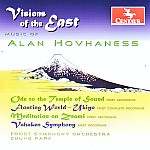This is one of the best Hovhaness recordings to come along in quite a while. Yes, much of his music has a familiar, repetitive quality: bells and gongs, rippling harps, sinuous Eastern melodies, the occasional fugue (especially in the symphonies), the use of glissandos, soft chord clusters, and rhythmically free episodes inspired by his study of Korean and Japanese traditional music, and a love of simple prettiness connects all of these pieces. But this doesn’t mean that they are identical.
For example, Floating World is a symphonic poem that includes a clear march episode (unusual in Hovhaness) and a more pungent harmonic language than we usually find. The symphony, in three movements of modest length, has a directness and concision that really is “symphonic”, comparatively. Both Ode to the Temple of Sound and Meditation on Zeami are just plain gorgeous, in the vein of Mysterious Mountain or Fra Angelico. All are CD premieres, and all are splendidly played and recorded by the orchestra of the University of Miami. Fans of the composer, and you know who you are, will definitely want this. [2/13/2009]
































